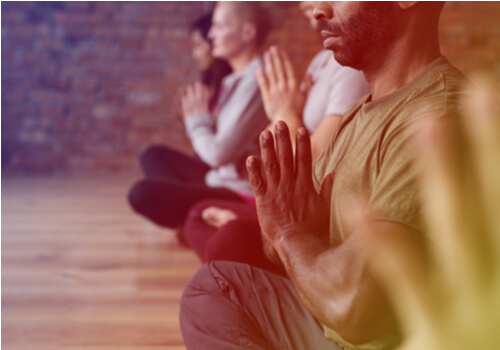The Effects of Collective Meditation on Society


Written and verified by the psychologist Elena Sanz
Nowadays, more and more people are being encouraged to practice meditation. In doing so, they experience great changes to their physical and emotional health. However, somewhat less well known, but equally important, are the effects of collective meditation on society.
This practice often provokes skepticism. Nevertheless, it’s been shown that the union of numerous meditators has a positive impact on social dynamics.
Next, we’ll explore some of the research that’s been conducted on this subject. In these studies, the power of meditation to generate changes at a global level is revealed.

The effects of collective meditation
Reduced crime rate
Between 1972 and 1978, the effects of a collective transcendental meditation program in various cities in the United States were investigated. The results showed that this practice had a significant influence on the decrease in the crime rate.
In addition, any variation in the number of weekly meditators was found to be associated with rates of violent crime. Similar results were found in other studies carried out in Manila and the Philippines.
On the other hand, between 1978 and 1991 the same hypothesis was put to the test in Merseyside (UK). It was, at that time, the metropolitan area with the third highest crime rate in the UK.
The study found that, when the group reached a sufficient number of meditators, there was a 13.4 percent drop in delinquency. In 1992, when the study was completed, Merseyside had the lowest crime rate in the country. It was 40 percent below the national average as well as significantly below its own predicted figures.
Decrease in violent deaths
In 1985, in Canada, two studies tested the effects of collective transcendental meditation undertaken by a large group of participants. As a result, a reduction in the number of suicides, homicides, and deaths due to traffic accidents was observed.
Furthermore, additional positive effects were found. For example, there was an increase in the quality of life of the population. This was due to the reduction in cigarette consumption and the decrease in labor strikes.
Impact on war, terrorism, and international conflicts
Between 1983 and 1985, in three periods of between eight-11 days, various practitioners came together to perform collective meditation. The hypothesis suggested that this would have some effect on terrorism and international conflicts.
The results confirmed the theory. They showed a 72 percent drop in terrorism and a 32 percent drop in international conflict during the meditation periods.
In 1983, a collective transcendental meditation was proposed in Jerusalem with the intention of improving the quality of life and positively affecting the war in Lebanon.
The positive influence of this practice was proven to reduce deaths from war, crime, and car accidents. In addition, there was an improvement in the stock market and the mood at the national level.

Collective meditation: a valuable tool
These surprising findings can be understood in the light of what we know as ‘collective consciousness’. The level of individual consciousness of each person is recognizable both by their brain wave emission and by the levels of certain neurotransmitters such as serotonin.
Those who have a higher level of consciousness reflect it in thoughts of greater tranquility and kinder and more altruistic acts. In contrast, people with a low level of consciousness experience more anger and irritability and are more likely to engage in criminal behavior.
However, each individual is influenced by the collective level of consciousness. In other words, we all make a contribution in one direction or another. In this regard, an offender is more or less likely to commit a crime depending on whether they’re immersed in an environment of stress or peace.
At some level, we’re all connected. We influence and are influenced by others. Therefore, by meditating, we’re not only obtaining personal improvements but also contributing to creating a more beneficial collective environment. In the light of these findings, the idea that unity is strength certainly seems to be the truth.
All cited sources were thoroughly reviewed by our team to ensure their quality, reliability, currency, and validity. The bibliography of this article was considered reliable and of academic or scientific accuracy.
- Assimakis, P. D., & Dillbeck, M. C. (1995). Time series analysis of improved quality of life in Canada: Social change, collective consciousness, and the TM-Sidhi program. Psychological Reports, 76(3_suppl), 1171-1193.
- Dillbeck, M. C., Banus, C. B., Polanzi, C., & Landrith III, G. S. (1988). Test of a field model of consciousness and social change: The Transcendental Meditation and TM-Sidhi program and decreased urban crime. The Journal of Mind and Behavior, 457-485.
- Hatchard, G. D., Deans, A. J., Cavanaugh, K. L., & Orme-johnson, D. W. (1996). The Maharishi Effect: A model for social improvement. Time series analysis of a phase transition to reduced crime in Merseyside metropolitan area. Psychology, Crime and Law, 2(3), 165-174.
- Orme-Johnson, D. W., Dillbeck, M. C., & Alexander, C. N. (2003). Preventing terrorism and international conflict: Effects of large assemblies of participants in the Transcendental Meditation and TM-Sidhi programs. Journal of Offender Rehabilitation, 36(1-4), 283-302.
- Orme-Johnson, D. W., Alexander, C. N., Davies, J. L., Chandler, H. M., & Larimore, W. E. (1988). International peace project in the Middle East: The effects of the Maharishi Technology of the Unified Field. Journal of Conflict Resolution, 32(4), 776-812.
This text is provided for informational purposes only and does not replace consultation with a professional. If in doubt, consult your specialist.








